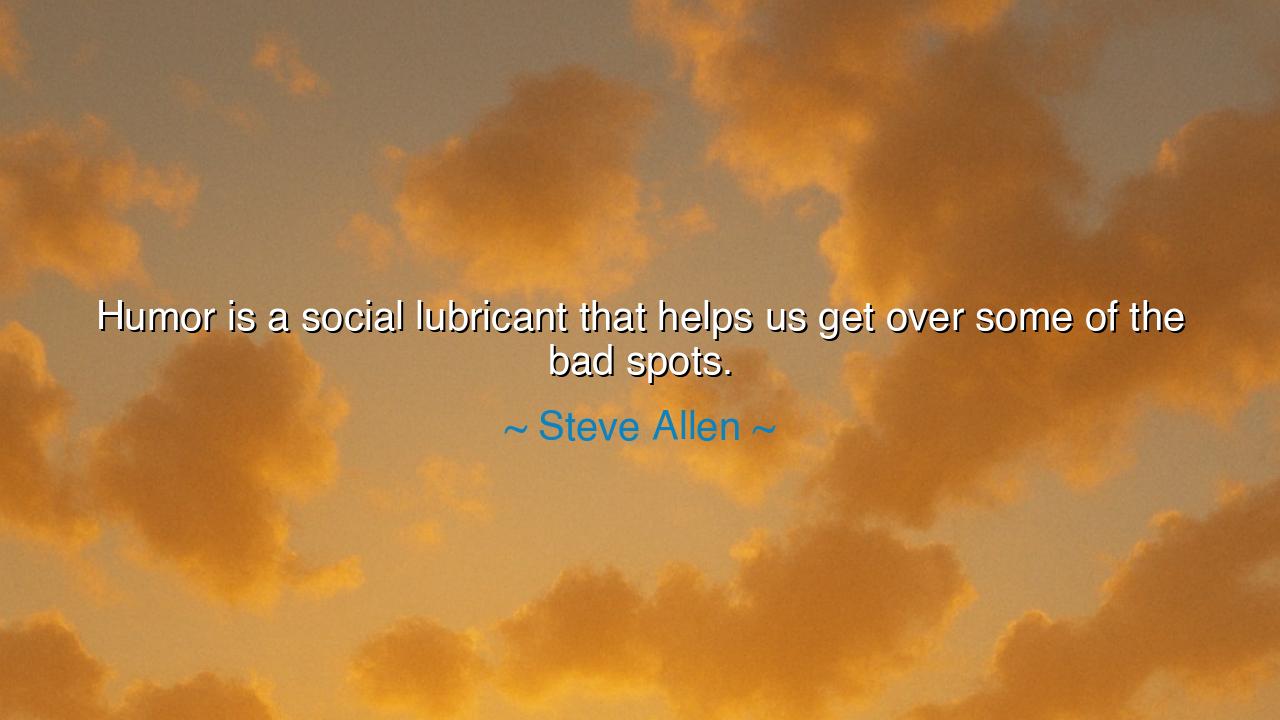
Humor is a social lubricant that helps us get over some of the






In the words of Steve Allen, “Humor is a social lubricant that helps us get over some of the bad spots.” Within this saying lies a truth as old as human speech itself — that laughter is not merely the sound of joy, but the balm that heals the wounds between souls. In every age, the wise have understood that humor is a bridge over the chasms of misunderstanding, a gentle oil poured upon the gears of human interaction to keep them from grinding with friction. It is a gift that smooths the rough edges of life, making the unbearable bearable, the awkward endurable, and the painful, forgivable.
Allen’s words spring from the heart of one who lived in the public realm, who understood the fragile balance between seriousness and levity. He saw that in society, where pride often collides with pride and ego with ego, humor has the power to disarm hostility and open hearts. For what argument can persist when both sides laugh together? What wound can remain festering when the balm of shared laughter softens its sting? To say that humor is a “social lubricant” is to say that it restores motion to the frozen places between us — it lets kindness flow again where resentment once stood.
From the earliest days, laughter has been the companion of fellowship. Around the ancient fires, when tribes gathered after long hunts or bitter struggles, they told stories that made them laugh. These were not idle amusements, but sacred rituals of survival — the way a people processed fear, loss, and exhaustion. When the warriors returned home, it was not the recounting of bloodshed that bound them, but the jokes told over the flames, transforming sorrow into strength. Thus, humor became not a distraction from life’s pain, but a way to move through it — to get over the bad spots, as Allen so simply put it.
History, too, offers proof of this truth. In the darkest years of World War II, when London was under siege and the nights were pierced by the sound of bombs, the people gathered in shelters — singing, joking, laughing. Even as rubble filled their streets, they found laughter in their resilience. This was not denial; it was defiance. The humor of those times became the spirit of endurance. The British called it the “stiff upper lip,” but what it truly was, was the wisdom of laughter — the understanding that to keep one’s humanity amid chaos, one must remember how to smile.
Humor, when pure and kind, does more than unite — it heals. It allows people to see one another’s hearts beyond the masks of fear and formality. A well-timed jest between strangers can melt the walls that pride erects; a shared laugh among friends can dissolve tension faster than any apology. Even in the realm of diplomacy, history records moments when humor turned the tide of hostility. It is said that Abraham Lincoln, in the midst of the Civil War’s grim weight, often told stories that made his advisors laugh. One protested, “Mr. President, how can you jest at such a time?” Lincoln replied, “If I did not laugh, I would surely weep.” Thus, humor became his shield and his solace, his way of holding the nation together through pain.
Yet, not all laughter is sacred. The ancients warned that mockery and cruelty masquerading as humor can wound rather than heal. The true humor that Steve Allen speaks of is compassionate humor — born not from scorn, but from understanding. It does not mock the fallen, but helps them rise; it does not divide, but unites. Such humor requires wisdom, empathy, and humility — the recognition that we are all flawed, and therefore, we all have cause to laugh at ourselves.
Let this, then, be the teaching carried forward: seek laughter not as escape, but as connection. When life grows tense, when words fail or anger thickens the air, let humor be the bridge. Smile before you speak; share a light moment before you cast a heavy judgment. Remember that laughter, like fire, can both warm or burn — use it to illuminate, not to destroy. And in your own life, when sorrow presses hard or misunderstandings threaten your peace, recall Allen’s wisdom: laughter can move you past the rough terrain of existence, one gentle step at a time.
For laughter is not only joy — it is the rhythm of life itself, the heartbeat of resilience. The wise do not laugh because life is easy; they laugh because they have endured. So when you find yourself amidst conflict or despair, do not retreat into silence. Instead, find the humor that humbles and uplifts. For in laughter, humanity remembers its unity — and in unity, it finds its way through the dark.






AAdministratorAdministrator
Welcome, honored guests. Please leave a comment, we will respond soon